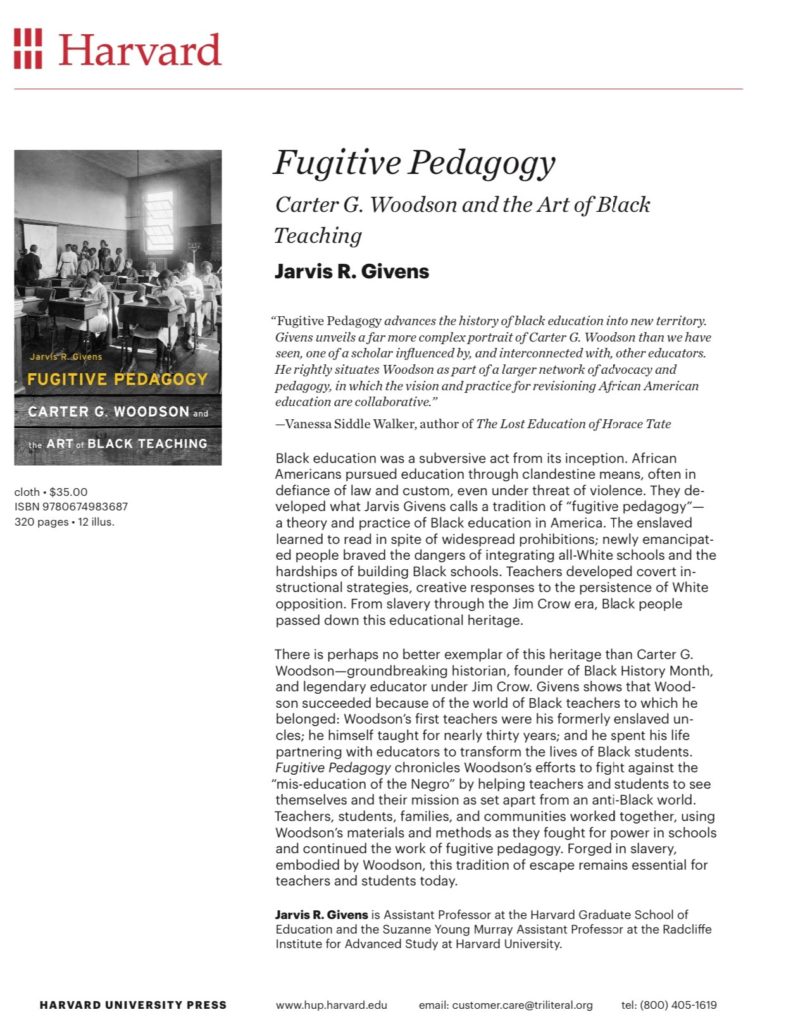E’ry day this month, the Center for Black Educator Development, in partnership with Phillys7thWard.org, will highlight a Black Educator Hall of Famer.
But, don’t forget, e’ry month is Black History Month…February is just the Blackest.
Today, our featured Black Educator is Dr. Carter G. Woodson.
Dr. Carter Godwin Woodson, the father of Black History Month, is one of the most preeminent scholars in American history. He was born in 1875 in Virginia. This son of formerly enslaved peoples, Woodson had a passion for Black history and sharing his knowledge with Black people. However, he was forced to work as a sharecropper and a miner, so Woodson could only devote part of his time to his studies.
Although he was unable to enroll into his local high school until he was twenty years old, Woodson was a quick study. He graduated from high school in less than two years.
Immediately after his graduation, Woodson entered the classroom as a teacher. Three years later in 1900, Woodson returned to his alma mater, Douglass High School, to serve as principal. He also spent time as an education supervisor in the Philippines. But most of his career was spent at Howard University, where he was a member of the faculty and served for a time as the dean of the College of Arts and Sciences. Woodson received his B.A. in Literature from Berea College, his M.A. from the University of Chicago, and became the second Black person to receive a Ph.D. in history from Harvard University.
Woodson knew that far too often, schools and districts cultivated anti-Blackness as a social competenceand holding, promoting, and acting on an anti-Blackness mindset was a part of being American.
A master teacher, Woodson’s major contribution to teaching and learning was bringing his vision to pass, with the assistance of other like-minded scholars. In Education Week, Dr. Jarvis Givens described the professional learning Dr. Woodson and his colleagues provided and the collaborations he helped to lead:
A decade before establishing Negro History Week, Woodson and his colleagues at the M Street School in Washington planned professional-development events for Black teachers, and they did so independent of the school district.
These workshops during the 1915-16 academic year extended from previous strategies they employed to work around the official school curriculum.
Woodson facilitated a history and civics workshop, which took place just after he published the inaugural issue of the Journal of Negro History—the first academic publication of its kind and one that Woodson founded and edited using the small salary he earned from teaching history, English, and French at the M Street School.
W.E.B. Du Bois—who had visited the school in previous years at the invitation of Anna Julia Cooper, the school’s principal at the time and the author of A Voice from the South: By A Black Woman from the South—led workshops on Black history for teachers.
In 1915, Dr. Woodson and his colleagues established the Association for the Study of Negro Life and History and the following year, he established the Journal of Negro History appeared. The Journal of Negro Education is one of the oldest learned journals in the United States. In 1926, he developed Negro History Week, which grew into Black History Month due to the freedom fighters of the Civil Rights Movement.
In 1933, he published the Miseducation of the Negro; one of the most seminal books of the 20th century. In 1937, Woodson published the first issue of the Negro History Bulletin. Woodson also produced a weekly column in Marcus Garvey’s Negro World.
Woodson was a prolific writer and transmitter of history. While he didn’t lack ambition, the creation of these historical organizations and publications were mainly due to Woodson’s feeling that the American Historical Association had little to no interest in Black history. Dr. Givens shares:
As a longtime public school teacher, Woodson witnessed white school leaders resist efforts to meaningfully transform curriculum and school policies, and while earning his doctorate from Harvard University, between 1908 and 1912, he learned how distortions about Black life were constructed at the highest levels of education.
Woodson was particularly interested in using Negro History Week to infuse students’ learning with critical knowledge about racial domination as well as the long traditions of Black resistance and achievement. Negro History Week quickly became a cultural norm in Black segregated schools. According to surveys conducted by Black educator and journalist Thomas L. Dabney in 1934, it was celebrated in more than 80 percent of those high schools by the mid-1930s.
He desired to create a space for Black history to flourish due to his belief that Black people ought to know their past so that they may move forward with strength and power.
Woodson once said:
If you teach the Negro that he has accomplished as much good as any other race he will aspire to equality and justice without regard to race. Such an effort would upset the program of the oppressor in Africa and America.
The education of Black youth is to serve to disrupt the western program of oppression. Education is, therefore, mainly for Black liberation.
Carter G. Woodson; a member of the Black Educator Hall of Fame.
#BlackEducatorsHoF #BlackTeacherPipeline
Dr. Jarvis Givens has written a book, Fugitive Pedagogy and the Art of Black Teaching, that centers Dr. Carter G. Woodson. You can find more information about Dr. Giles’s work here.
For more information on Carter G. Woodson, visit the following site.


